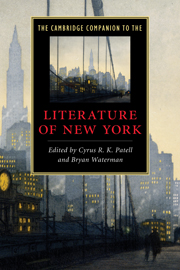Book contents
- Frontmatter
- Introduction
- 1 From British outpost to American metropolis
- 2 Dutch New York from Irving to Wharton
- 3 The city on stage
- 4 Melville, at sea in the city
- 5 Whitman’s urbanism
- 6 The early literature of New York’s moneyed class
- 7 Writing Brooklyn
- 8 New York and the novel of manners
- 9 Immigrants, politics, and the popular cultures of tolerance
- 10 Performing Greenwich Village bohemianism
- 11 African American literary movements
- 12 New York’s cultures of print
- 13 From poetry to punk in the East Village
- 14 Staging lesbian and gay New York
- 15 Emergent ethnic literatures
- Further reading
- Index
- Series list
Introduction
Published online by Cambridge University Press: 28 November 2010
- Frontmatter
- Introduction
- 1 From British outpost to American metropolis
- 2 Dutch New York from Irving to Wharton
- 3 The city on stage
- 4 Melville, at sea in the city
- 5 Whitman’s urbanism
- 6 The early literature of New York’s moneyed class
- 7 Writing Brooklyn
- 8 New York and the novel of manners
- 9 Immigrants, politics, and the popular cultures of tolerance
- 10 Performing Greenwich Village bohemianism
- 11 African American literary movements
- 12 New York’s cultures of print
- 13 From poetry to punk in the East Village
- 14 Staging lesbian and gay New York
- 15 Emergent ethnic literatures
- Further reading
- Index
- Series list
Summary
“Now Dick had listened to all this conversation. Being an enterprising young man, he thought he saw a chance for a speculation, and determined to avail himself of it. Accordingly he stepped up to the two just as Frank's uncle was about leaving, and said, “I know all about the city, sir; I'll show him around, if you want me to.”
The gentleman looked a little curiously at the ragged figure before him.
So you are a city boy, are you?
Yes, sir,” said Dick, “I've lived here ever since I was a baby.”
“And you know all about the public buildings, I suppose?”
“Yes, sir.” / “And the Central Park?”
“Yes, sir. I know my way all round.”
The gentleman looked thoughtful.
“I don't know what to say, Frank,” he remarked after a while. “It is rather a novel proposal. He isn't exactly the sort of guide I would have picked out for you. Still he looks honest. He has an open face, and I think can be depended upon.”
“I wish he wasn't so ragged and dirty,” said Frank, who felt a little shy about being seen with such a companion.”
Horatio Alger, Jr., Ragged Dick.What is it that the Kander and Ebb song says about New York City? “If I can make it there, / I'd make it anywhere.” From its origins as a Dutch mercantile center to its modern incarnation as the financial center of the United States and a target for the terrorists of 9/11, New York, as the song suggests, has held a special place in the country's national mythology.
- Type
- Chapter
- Information
- Publisher: Cambridge University PressPrint publication year: 2010
- 1
- Cited by



